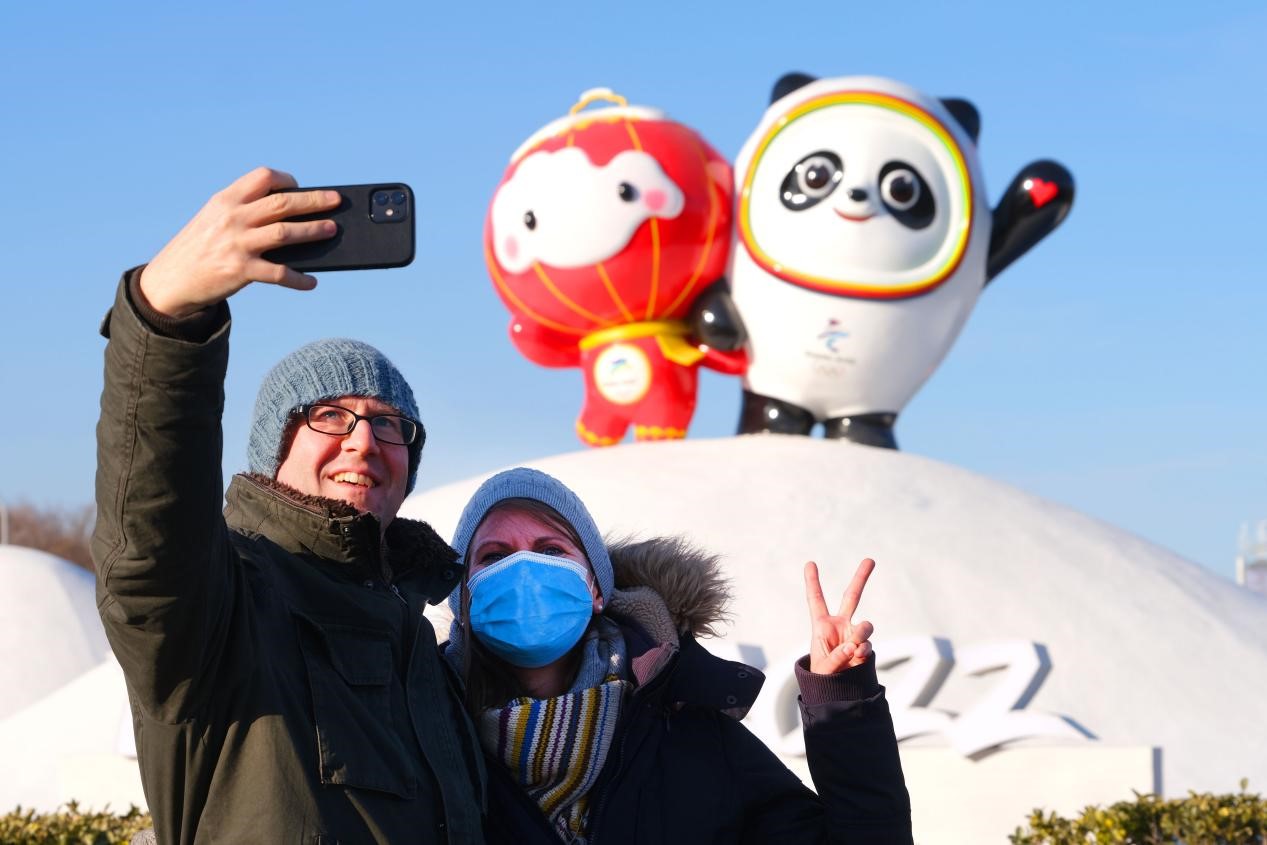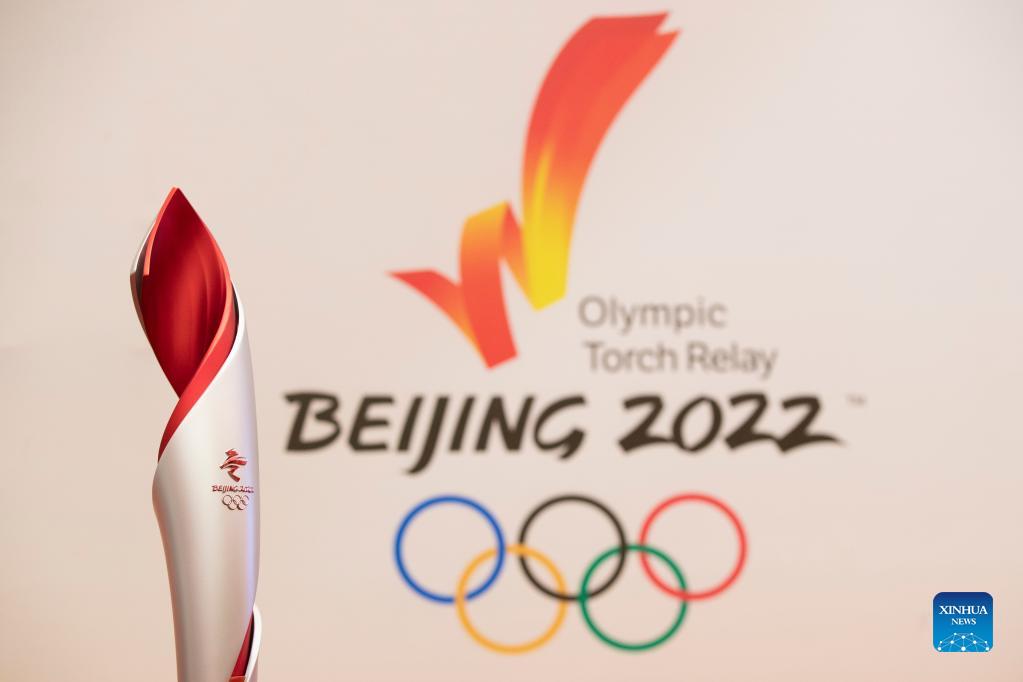South Asian countries’ firm support for Beijing Winter Olympics a powerful rebuff of U.S.-led boycott

Participants conduct test on the track during the biathlon international training week at the National Biathlon Center in Zhangjiakou competition zone of the Beijing 2022 Olympic and Paralympic Winter Games, in Zhangjiakou, north China's Hebei Province, Dec. 28, 2021. (Xinhua/Mu Yu)
At the beginning of 2022, the Chinese government and people are going to present to the world the Beijing Winter Olympic Games as a New Year's gift in the Chinese New Year of the Tiger. There is little doubt that the world's eyes will be on Beijing as it hosts the Winter Olympics from Feb. 4 to 20, followed by the Paralympics from March 4 to 13.
After hosting the successful 29th Olympic Summer Games in 2008, which demonstrated China's emerging economic status, 14 years later on Feb. 4, with the lighting of the Olympic Flame for the second time in the nation's capital, Beijing with its thousands-year history will become the first "Dual Olympic City" in the world, creating a legacy 1.4 billion Chinese should be proud of.
Needless to say, the 16-day-long Beijing Winter Olympic Games will give an opportunity for all participating athletes from all over the world to display their ice and snow skills at all 12 venues of the Games, including at the Beijing Competition Zone, Yanqing Competition Zone and Zhangjiakou Competition Zone, while understanding China's vision for a "green, inclusive, open and clean" Olympics. It’s really energizing to see that all 12 venues for the 2022 Winter Olympics and Paralympics will be powered by green electricity for the first time in Olympic history, thus making the quadrennial winter sports spectacle carbon neutral.
Undoubtedly, the winter sporting jamboree, with an updated motto of "Faster, Higher, Stronger – Together," will bring together people from different countries, ethnic groups and cultural backgrounds hand-in-hand to build "a community with a shared future for mankind" – a concept envisioned by Chinese President Xi Jinping. It can be said that China’s hosting of the Winter Olympics and subsequent Paralympics has demonstrated the country's willingness to promote world peace, common development and friendship through sports.
However, the 2022 Winter Games is going to take place at a time when the whole world is under the cobwebs of the coronavirus pandemic, especially the Omicron variant that continues to affect lives, along with economic conditions that remain uncertain. But Beijing has made use of remote prevention and control measures, closed-loop management and vaccination for over 2,000 athletes and other participants from across the world to deliver a “streamlined, safe and splendid” Olympic event. The preparation work for the Beijing Winter Olympics has won high appreciation from International Olympic Committee (IOC) President Thomas Bach as a "miracle."

Foreigners take selfies with official mascots of the Beijing 2022 Olympic and Paralympic Winter Games—Bing Dwen Dwen and Shuey Rhon Rhon in Beijing, Jan. 12, 2022. (People’s Daily Online/Guo Junfeng)
Unfortunately, dirty politics has invaded the Beijing Winter Olympic Games as a "senseless" "diplomatic boycott" by the U.S. and its allies, namely Australia, Canada, and Britain, among others, has cast a shadow over the winter sporting event. But the so-called allegations of "forced labor" and "violation of human rights" in northwest China's Xinjiang region is nothing but a total disregard of facts that only exhibits a biased American perspective of China.
Obviously, the U.S. has become baffled by China's peaceful rise on the world stage and therefore, has wielded sports as a political wand to enhance its superiority by grossly interfering in China's internal affairs regarding unfounded accusations against China's Hong Kong, Tibet and Xinjiang regions. Surely, such a "diplomatic boycott" instigated by the U.S. and its allies is totally illogical and goes against the Olympic spirit of brotherhood and fraternity that characterize the international event.
However, while the U.S. has attempted to sabotage the Beijing Winter Olympic Games, a majority of governments across the world have expressed their support for China's commitment and determination to organize the Winter Olympics. Several world leaders also criticized the U.S. "diplomatic boycott" of the Beijing Winter Olympics, saying that the Games should be "free of politics."
None of China's immediate neighbours in South Asia have joined the boycott. Although the South Asian region's performances on the Olympics stage have always been disappointing in terms of medal counts, India, Pakistan, Bangladesh, Sri Lanka, the Maldives, and Nepal– each and every one has expressed their support for China's hosting of the Beijing Olympics.
India unequivocally expressed its support for China to host the Winter Olympic and Paralympic Games during a Russia-India-China foreign ministers virtual meeting on Nov. 26, 2021.
Mohammad Arif Khan, the first Indian to qualify in two different events at the Winter Olympics, will compete the the slalom and alpine skiing during the Beijing Olympics. Harjinder Singh has been appointed as India's Chef de Mission for the upcoming sporting event. In light of India's support for the Beijing Winter Olympics, it is hoped that India and China, two close neighboring countries, might work together for brighter ties and leave aside their contradictions on the border dispute.

The torch is seen during the Torch Exhibition Tour of Olympic Winter Games Beijing 2022 in Harbin, northeast China's Heilongjiang Province, Jan. 5, 2022. (Xinhua/Zhang Tao)
The way that all South Asian nations, regardless of their respective political views and disparities, have slammed the U.S.-led “diplomatic boycott” of the Beijing Winter Olympics and opposed any action that could politicize the sporting event only serves to further underscore their shared spirit of togetherness and solidarity with China in the name of sport.
Meanwhile, three athletes from Pakistan are similarly preparing to participate in the Winter Games. Notably, Pakistan's Prime Minister Imran Khan, along with other international dignitaries such as Russian President Vladimir Putin, Argentine President Alberto Fernandez, Mongolian Prime Minister Luvsannamsrai Oyun-Erdene, Maldivian Foreign Minister Abdulla Shahid, and UN Secretary-General Antonio Guterres will be in attendance, to list a few, and have stated their intent to attend the opening ceremony of the mega event. Undoubtedly, South Asian countries’ unified support for the Winter Olympic Games is a "no-confidence vote" against the U.S.-led "diplomatic boycott" of the Beijing Winter Olympics that will ultimately put U.S. credibility in serious doubt.
The ultimate goals of the Olympics are to cultivate the genius of human athleticism through sports, and to contribute to the building of a peaceful and better world. The political posturing by the U.S. and some of its Western allies is undoubtedly a pre-planned farce, being well-calculated and mischievously motivated in their moves, and which have no impact whatsoever on the success of the Beijing Winter Olympic Games, just as stated in the words of China's State Councilor and Foreign Minister Wang Yi: "The political maneuvering of a few Western politicians will do no harm to a splendid Olympic Games, but only expose their ugly intention." It can only be hoped that the Beijing Winter Olympics will make a contribution to further strengthening friendships and cooperation throughout the world.
Rabi Sankar Bosu is founder and secretary of New Horizon Radio Listeners' Club, a Sino-India friendship club based in West Bengal, India.
The opinions expressed in the article reflect those of the author, and not necessarily those of People's Daily Online.
Photos
Related Stories
- Everything is possible: Chinese baker and Brazilian nurse share a Beijing Winter Olympic dream
- Olympic-song composer says Olympic Games changed his life
- Swiss snowboarders in pole position for 2022 Beijing Winter Olympics
- Beijing Winter Olympics to be very successful: Albanian official
- Technology makes Winter Games more splendid
Copyright © 2022 People's Daily Online. All Rights Reserved.










